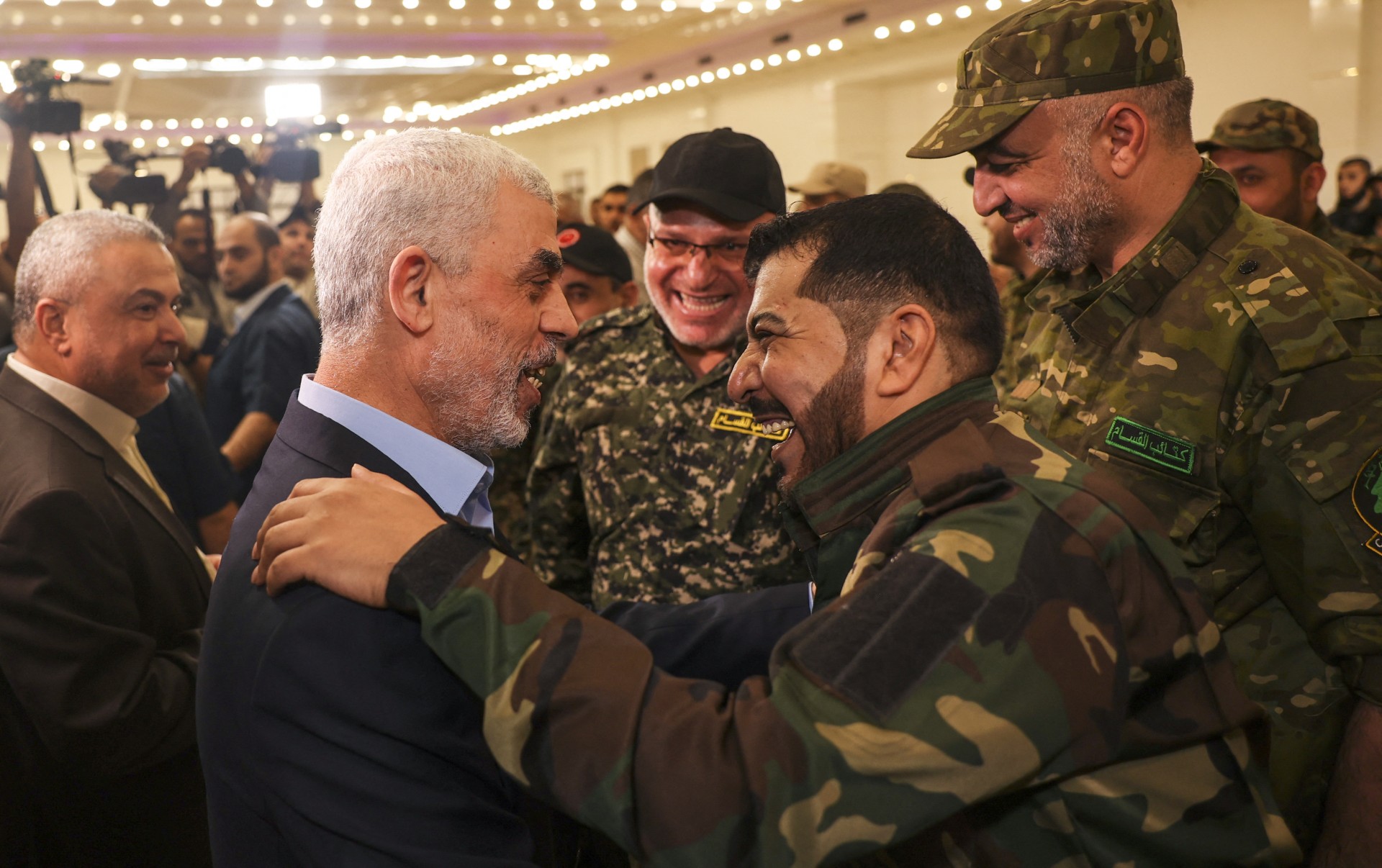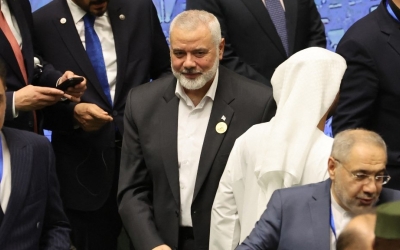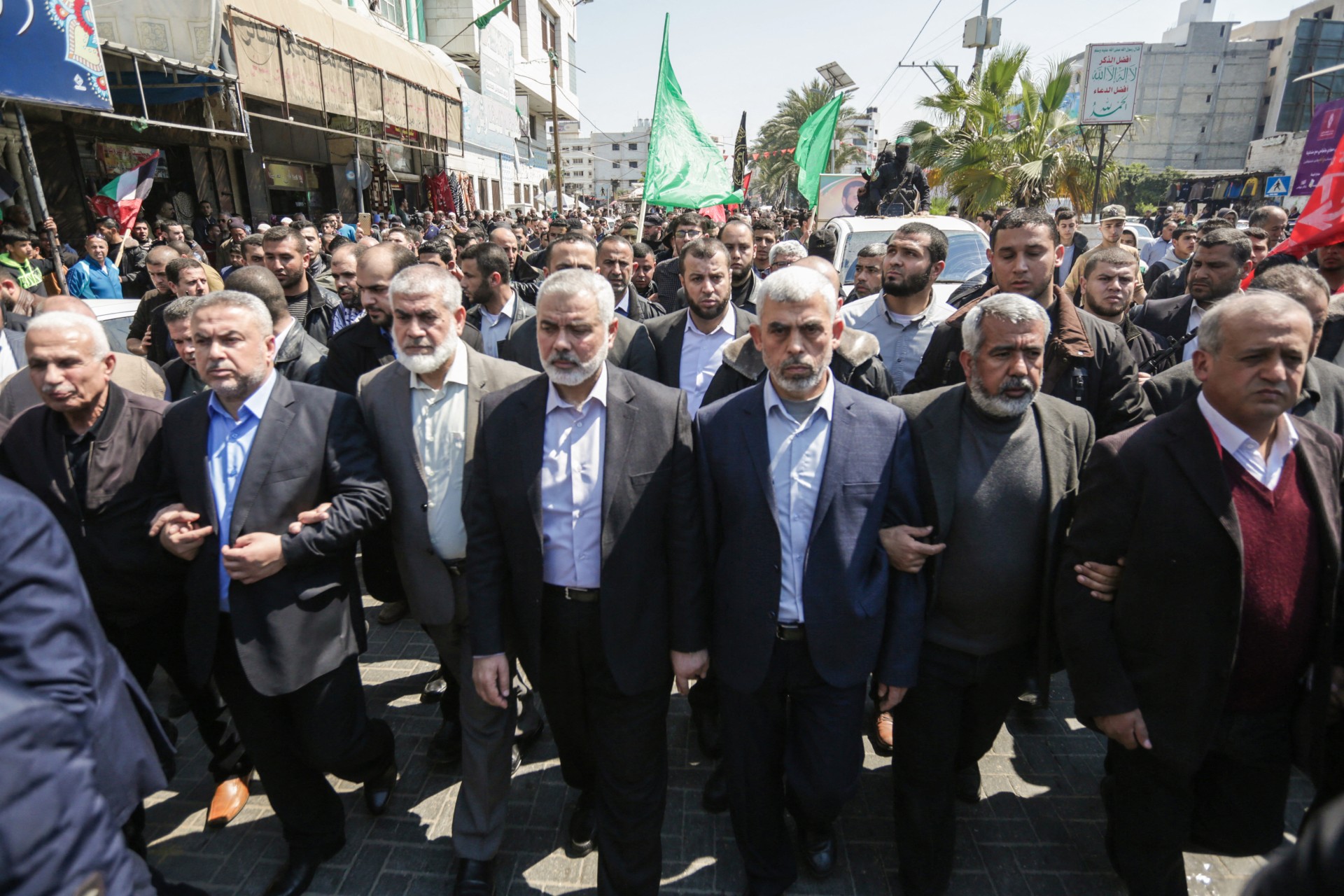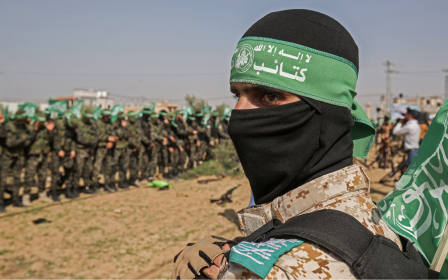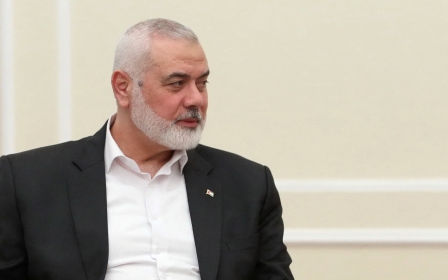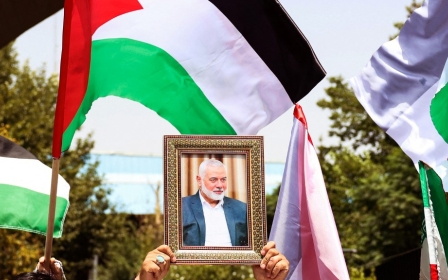Why Hamas picked Yahya Sinwar as its new leader
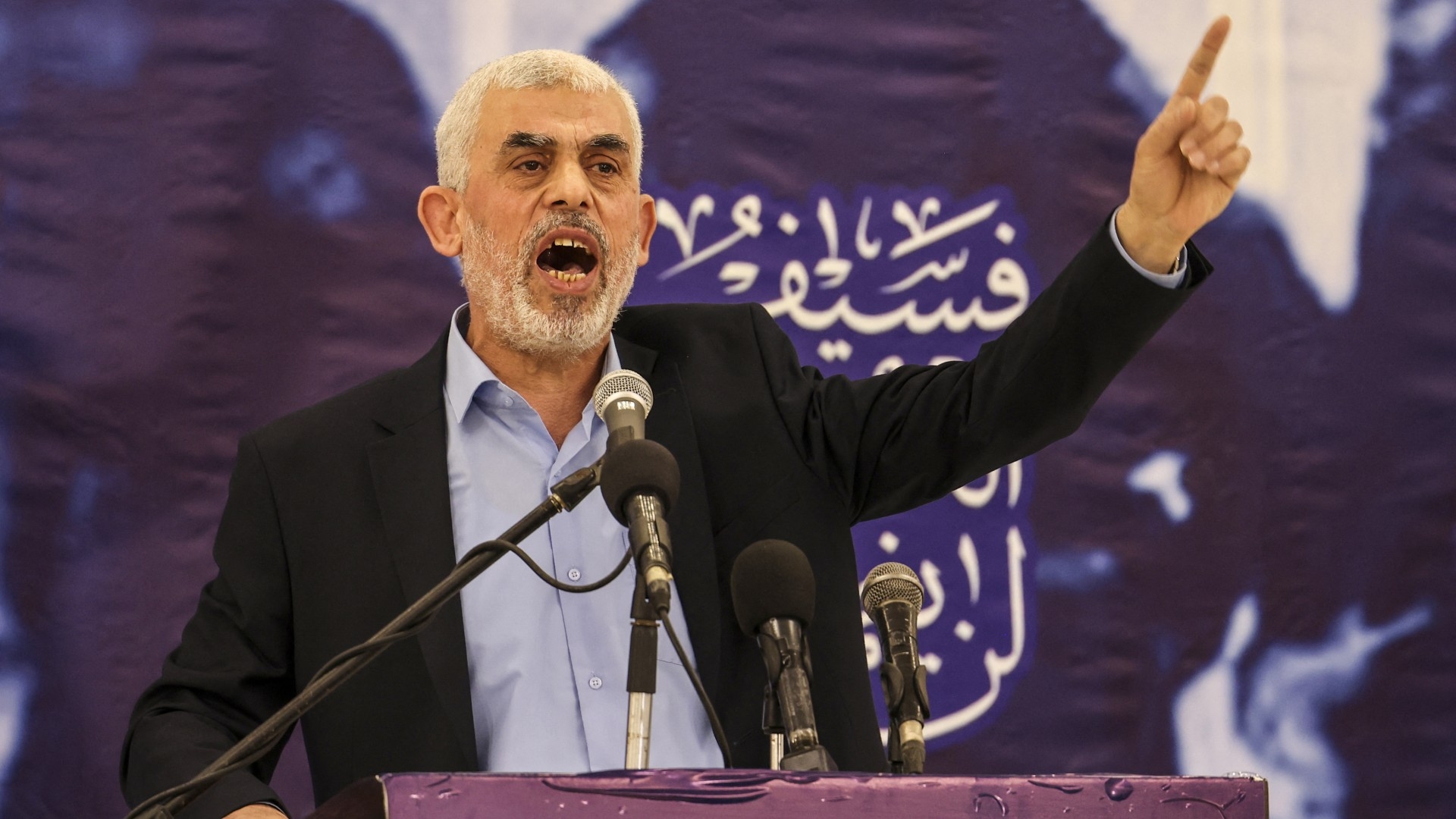
Yahya Sinwar, Israel's most wanted man and believed to be in tunnels deep below the Gaza Strip, is the new political leader of Hamas.
The assassination of his predecessor, Ismail Haniyeh, in Tehran last week left the Palestinian movement with a leadership decision to make that would define its direction and outlook.
It is a decision that the internal hierarchy made within a matter of days.
Internally promoting Sinwar, who headed Hamas in Gaza, was intended as a "bold message", according to academic Khaled Hroub.
It is a message "that the movement is not caving under pressure, and not in the mood of compromising its positions and declared adherence to resistance," Hroub, author of Hamas: A Beginner's Guide, told Middle East Eye.
New MEE newsletter: Jerusalem Dispatch
Sign up to get the latest insights and analysis on Israel-Palestine, alongside Turkey Unpacked and other MEE newsletters
"If Israel, the US and their allies in the region and beyond hoped that they can subdue Hamas by force, the movement’s answer is a more radical line of politics."
Sinwar is widely thought to have been the architect of the surprise attack on southern Israel on 7 October, in which Palestinian fighters killed around 1,200 Israelis and captured more than 250 others.
Since then, Israel has killed more than 39,000 Palestinians in Gaza.
Leila Seurat, author of The Foreign Policy of Hamas, said Sinwar's appointment was driven both by internal strategy and the desire to send a signal to Israel.
"Hamas told Israel: 'You started a war of extermination, so we're going to choose the one who started Al-Aqsa Flood," she told MEE, referring to Hamas' name for the 7 October attack.
Traditionally there are three major power bases within Hamas: one that’s based outside of Palestine, one in the occupied West Bank, and one in Gaza.
As such, the new leader was likely to have been picked from among three men: Khaled Meshaal, the former leader of Hamas' political bureau based in Doha, Zaher Jabareen, deputy leader in charge of the movement in the occupied West Bank, or Sinwar, who has led Hamas in Gaza since 2017.
Bassem Naim, a Hamas official and former Gaza health minister, told MEE that Sinwar is Haniyeh's successor "according to the internal regulations of Hamas".
Naim said that after the killing of Haniyeh, the group was signalling it was "moving in the same direction, committed to the same path" as previously, including in its commitment to Al-Aqsa Flood.
'Gaza calls the shots'
Azzam Tamimi, activist and author of two books on Hamas, told MEE that Sinwar's promotion showed that "Gaza today is the one that calls the shots".
"It’s interesting to know that Khaled Meshal, who was the favourite in many people’s eyes, was the one who insisted on Sinwar’s appointment," he said.
Sinwar, who was born in southern Gaza’s Khan Younis refugee camp, was close to Hamas founder Ahmed Yassin, and founded the group’s internal security bodies.
He was imprisoned for 23 years by Israel over his alleged role in killing Palestinians suspected of collaborating with the Israeli military.
Sinwar is believed to have risen to prominence as a senior member of Hamas’ first security apparatus, Majd, by hunting and eliminating collaborators with Israel.
During his time behind bars, Sinwar read Israeli newspapers and learnt Hebrew, which he said helped him better understand his enemy.
In 2011, he was one of the most prominent prisoners freed along with 1,047 other Palestinians in exchange for Israeli soldier Gilad Shalit, who was abducted by Gaza fighters in a cross-border raid in 2006.
Over the past decade, Sinwar has built up his influence in Gaza, particularly in its military affairs.
"By selecting a man in the besieged and devastated Gaza Strip, Hamas gives a strong statement of defiance and steadfastness that it will remain in the Gaza Strip and Palestine - a primary force that can’t be ignored," said Hroub.
Hamas official Naim said it was "very symbolic to have the leadership in Gaza, where the battle is".
"It is a stronger commitment from the whole leadership to back up this battle starting from 7 October until today."
'It is very symbolic to have the leadership in Gaza, where the battle is'
- Basem Naim, Hamas official
Sinwar as political head of Hamas bridges a perceived gap between the leadership inside and outside Palestine, according to Hroub.
Hamas' military decisions in Gaza have for some time been in the hands of Sinwar and his circle, while the external leadership took charge of diplomacy.
While that division of labour mostly worked, said Hroub, it created "some gaps and impressions of differences between ‘moderate’ and ‘radical’ camps".
"By unifying the military and political leadership in one man, and as powerful as Sinwar, Hamas sends a message of unity and resilience," said Hroub.
For Seurat, the internal promotion of Sinwar was the manifestation of a reality that had already existed for years.
"Even before 7 October, Sinwar has been the man in charge. Not just in Gaza, but the main decision maker in Hamas," she said.
"The outside leadership has been marginalised for some time. The leaders in Gaza took back decision making within Hamas a decade ago," she added.
“This decision to make him political head is a continuation of a process which has been happening since 2013, when Sinwar was appointed to the politburo for the first time.”
The day-to-day workings of Hamas would not change, Naim said.
"Every leader knows exactly his duties and tasks and it will continue as before."
Iran, Qatar and PA keeping keen eye
Sinwar’s promotion was also a decision heavily influenced by Hamas’ affairs with other actors, abroad and within Palestine.
Tamimi said his appointment will please Iran, something that Hamas won’t mind, as “so-called Sunni Arab regimes” continued to be hostile to the movement.
“Despite Iranian security failures that have led to the assassination of Haniyeh, Iran is seen as one of very few allies Hamas continues to have in the region today,” Tamimi said.
“All attempts by Meshal in recent years to convince the Saudis and the UAE to end their hostility to the movement did not come to fruition,” he added, noting that such considerations likely discouraged Meshal from contending for the top role.
Seurat said that Meshal did not have good relations with Iran, which would have been an important factor in opting for Sinwar.
Under Meshal’s political leadership, Hamas distanced itself from Bashar al-Assad’s government in Syria after the outbreak of civil war. Iran, a key ally and backer of Assad, has not forgotten this.
Qatar will be affected by the new direction of Hamas, too.
Since Haniyeh's killing, Doha no longer hosts the head of a movement classed as a terrorist organisation by much of the western world.
"Shifting the balance of power to the inside leadership will definitely ease the pressure from Qatar and other countries that host Hamas, fully or partly," said Hroub.
"In the negotiations, these hosting countries will have less leverage on Hamas to pressure them to accept what they otherwise wouldn’t accept."
Hamas' bitter political rival in Palestine, Fatah, will also be keeping a keen eye on affairs.
Sinwar has a strong relationship with various Palestinian groups.
He spearheaded Hamas' reconciliation talks with Fatah and the Palestinian Authority (PA) in 2017 under the supervision of Egypt, which he has a close security relationship with.
"He is a strong supporter of Palestinian unity," said Naim. "We should wait for further details from his side, but I am sure he is supportive of any efforts towards Palestinian unity and ending the division."
In 2021, Sinwar supported an agreement with PA President Mahmoud Abbas to organise Palestinian elections. Abbas ultimately backed out of carrying out the polls, citing Israeli restrictions over voting in East Jerusalem.
'Shifting the balance of power to the inside leadership will definitely ease the pressure from Qatar'
- Khaled Hroub, author
"There is this perception that Haniyeh was more pragmatic, more open and more conciliatory. But I don't think it's a true statement," Sami Al-Arian, an academic and human rights activist, told MEE.
Sinwar "was ready to make any compromises provided that there was a common ground", he said.
Al-Arian added that the sticking point in Palestinian unity talks was not personalities, but rather Fatah's political programme and Abbas' rejection of "any form of resistance" against Israel and its occupation.
As for Gaza ceasefire talks with Israel, Tamimi believes a change of leadership in Hamas is not the deciding factor.
"It’s Netanyahu who has consistently torpedoed ceasefire talks," he said. "He is the one who is keen to keep the war raging because ending it is not in his interest."
Naim said that the Israeli prime minister was using lengthy ceasefire negotiations as a cover for his "intention to widen this war into a regional war".
"We are waiting for the Israelis and the mediators, mainly the Americans, to bring a clear acceptance - without any reluctance or hesitation - of the ceasefire deal we have agreed upon."
Middle East Eye delivers independent and unrivalled coverage and analysis of the Middle East, North Africa and beyond. To learn more about republishing this content and the associated fees, please fill out this form. More about MEE can be found here.


